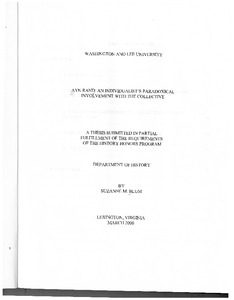| dc.rights.license | In Copyright | en_US |
| dc.creator | Blum, Suzanne Miriam | |
| dc.date.accessioned | 2023-04-21T19:30:33Z | |
| dc.date.available | 2023-04-21T19:30:33Z | |
| dc.date.created | 2000 | |
| dc.identifier | WLURG038_Blum_thesis_2000 | |
| dc.identifier.uri | https://dspace.wlu.edu/handle/11021/36191 | |
| dc.description.abstract | Ayn Rand's paradoxical involvement with collective organizations began early in her career during her crusade against communism. Rand developed her anti-communistic ideas as an
individual during her youth in Soviet Russia. Her first blow against communism was also an individual effort that occurred in her writing. Her first novel, We the Living, explained the
philosophical immorality and horrific consequences of communism in Soviet Russia to each of Rand's readers. Rand's involvement with collective organizations came in the 1940s, when she
believed that a group of competent individuals could accomplish more in the anti-communist crusade than they could separately. Rand's idea of bonding together as a collective to fight for
the individual seemed contradictory considering her ardent individualism. Rand herself argued that contradictions did not exist, but rather people assumed that two premises were correct when
only one was valid. The faulty premise in Rand's seemingly contradictory action was the belief that she could accomplish more within a group than she could as an individual in her crusade
against communism. Rand learned her lesson with great difficulty. She tried to work with several different organizations, yet each time she proved to be too radical, too uncompromising,
and too individualistic for her colleagues. Anti-communism was Rand's first failed attempt at leading a collective organization, but it was not the most destructive to her philosophy, which came with the end of organized Objectivism in late 1968. . . . Rand never imagined Objectivism as an organized movement. At the time of the schism, Rand wrote, "I never wanted and do not now want to be the leader of a 'movement. ' I do approve of a philosophical or intellectual movement, in the sense of a growing trend among a number of independent individuals sharing the same ideas. But an organized movement is a different matter . . . . " Rand was passionate about her philosophical ideas and wanted to communicate them to others with the hopes of improving society. Rand's actions with collective organizations, both in her crusade against communism and in organized Objectivism, did not help her achieve this goal. Her efforts in organized anti-communism were frustrating and generally achieved very little impact on society. Her participation in organized Objectivism proved much more destructive by discrediting the validity of her philosophy. After the failure of NBI, Rand refused to let any of her intellectual colleagues create another organization devoted to Objectivism. Perhaps Rand finally learned that she was far too individualistic for a collective organization and that she achieved her greatest glory as a writer communicating her ideas to each of her readers, individually. [From Conclusion] | en_US |
| dc.format.extent | 79 pages | en_US |
| dc.language.iso | en_US | en_US |
| dc.rights | This material is made available for use in research, teaching, and private study, pursuant to U.S. Copyright law. The user assumes full responsibility for any use of the materials, including but not limited to, infringement of copyright and publication rights of reproduced materials. Any materials used should be fully credited with the source. | en_US |
| dc.rights.uri | http://rightsstatements.org/vocab/InC/1.0/ | en_US |
| dc.subject.other | Washington and Lee University -- Honors in History | en_US |
| dc.title | Ayn Rand: An Individualist's Paradoxical Involvement with the Collective | |
| dc.type | Text | en_US |
| dcterms.isPartOf | WLURG38 - Student Papers | |
| dc.rights.holder | Blum, Suzanne Miriam | |
| dc.subject.fast | Rand, Ayn | en_US |
| local.scholarshiptype | Honors Thesis | en_US |
